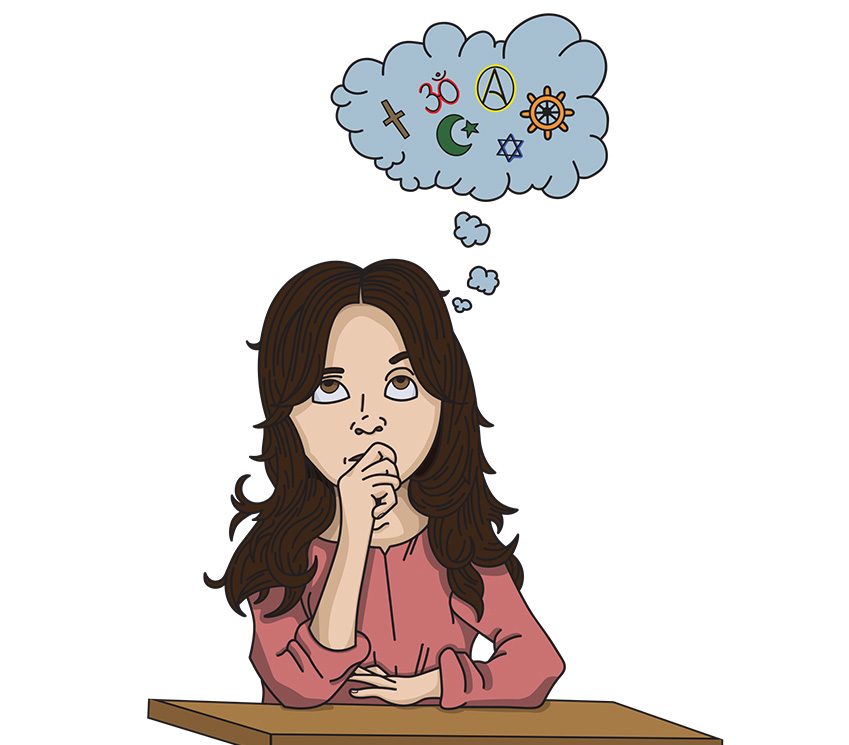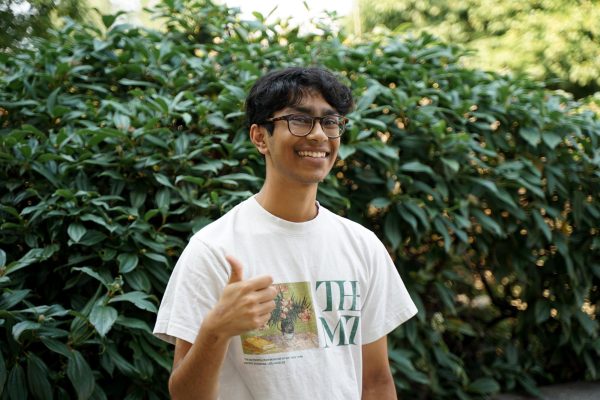Regardless of specific beliefs, each religion is capable of providing a space to belong. Whether it is a religious camp, a youth group or a place of worship, religion is linked to community, personal identity and overall purpose. In a Nordic News survey of 56 respondents, 23 students currently practice a religion. Inglemoor’s religious population consists of a variety of practices, including Islam, Judaism, Hinduism, Buddhism, Mormonism, Catholicism, other forms of Christianity and more.
Sophomore Ahmed Chaieb (he/him) practices Islam, and said he has embraced the impact it’s had on his life.
“I feel like my religion makes up everything about me. So, I’d say it’s probably changed me in a lot of ways,” Chaieb said. “I think that applies for almost every person with a religion — if you’re part of any group, that kind of changes how you do everything.”
Junior Jezelle Wozow (she/her) said she often finds herself referencing and relying on her religion — Christianity — in her everyday life.
“Just the daily decisions you make — like if I’m angry at someone or something’s not going my way — I can just know that there’s a plan and that there’s a bigger purpose,” Wozow said. “If I don’t get into the college I want to, golf’s not going the way I want to, I know that it’s all for a reason, and that just influences me so much.”
Others have found great community within their religion, and several of their religion’s teachings have taught them joy and balance. Junior Ayano Meier (she/her) is Nichiren Buddhist, which is a branch of Buddhism based on the teachings of Japanese priest Nichiren.
“Each person inside has the courage and compassion and the strength to overcome any challenge that you go through life and to really become happy,” Meier said.
In addition to affecting personal values, religion can also provide students with a sense of community. Sophomore Emily Pranzini (she/her) said she has always loved the support and safety she’s experienced within Judaism.
“I have been more recently getting very involved in the Jewish community, with youth groups, with my temple, with other Jewish peers,” Pranzini said. “I’ve never been more welcomed in a community than the Jewish, and I just always know that they’re my favorite people. I think that’s because of the values and teachings.”
Similarily, Meier said she appreciates knowing other Buddhists, and the people around her in general.
“I feel like you really have to rely on your community. Your people, other people in faith with you, your parents, whatever place you go to. And also, I feel like, you shouldn’t be ashamed and you shouldn’t quiet yourself down,” Meier said. “Always be proud. I feel like you always have to be proud of your religion.”
While religion can provide some with a positive space, some students also struggle with their relationship with religion. Junior Montana Ferguson (they/them)* said that they have difficulties in their experiences with Evangelism — a branch of Christianity that believes in spreading the Christian gospel through public preaching or personal witness — and that it has caused tension in their family. Ferguson said that the rift between their mother and them was largely due to the toxic environment they experienced in church, and their mother was disappointed with their declined passion for Evangelicism.
Ferguson said their church does not welcome LGBTQ+ individuals and often disparages the identities of the members of that community in the name of Evangelism. They said the attitudes of the church were the primary cause of their struggle with self-image and expressing emotion in a healthy way.
“They were like, ‘Oh, look at this sinful person.’ It just sucked, but the worst part was after the main sermon, you would discuss it in smaller groups. You basically just got a bunch of kids together and had them come up with a bunch of transphobic arguments,” Ferguson said.
Ultimately, Ferguson chose to not attend church or follow Evangelism anymore. They said that they are happy without it.
“I think a big part of it is just the absence of guilt and shame. Being able to let that go and just realize, ‘Oh, maybe I’m not inherently evil just because I exist,’” Ferguson said.
Ferguson said they also had an issue with the toxic positivity of the church, the belief that no matter how difficult a situation may be, one must always keep a positive mindset.
“For example, if you’re not happy, it’s because your relationship with God isn’t strong enough. So that’s a sign that you’re a bad person. So, you have to always be positive and always be happy,” Ferguson said.
Along with challenges within religion, there can also be judgement surrounding it. Sophomore Varshni Iyer (she/her) is Hindu, and she said she has received disrespectful comments from people outside of her religion. Iyer credits that to the general lack of knowledge surrounding her beliefs.
“Some beliefs, like some cultural things, people view as weird. Like eating with our hands — I’ve been made fun of, especially different Hindu foods, different Indian foods — people give you looks, so sometimes you don’t feel respected and sometimes you do,” Iyer said. “Everyone knows a bunch about the more popular religions, and then you bring up something like a Hindu holiday. They’re like, ‘What, what’s that?’”
Despite the cultural misconceptions from some, others like Chaieb said he has respect for all religions no matter what, and that he does not believe any one is better than another.
“We believe that God put those religions out there. I don’t know why, but he did. He wouldn’t have put it out there if it wasn’t for a good purpose,” Chaieb said. “I feel like everybody in their religion means something to them. So who are we to tell them that theirs doesn’t mean anything?”













Curtis • Apr 18, 2024 at 10:01 AM
As an old man, it’s good to see that young people are starting to think about their spiritual welfare. It’s the most important facet of your life as you will find out as you mature. 👌